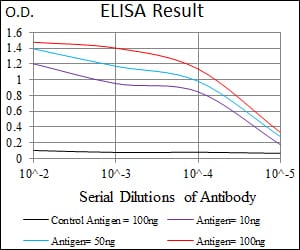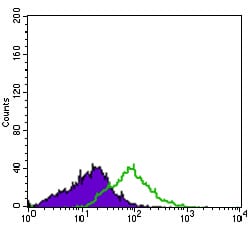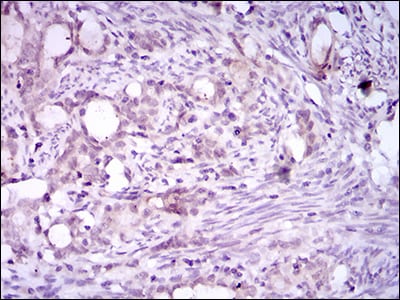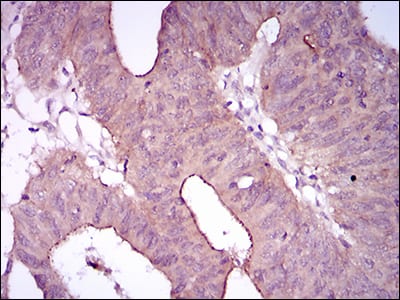



| WB | 咨询技术 | Human,Mouse,Rat |
| IF | 咨询技术 | Human,Mouse,Rat |
| IHC | 咨询技术 | Human,Mouse,Rat |
| ICC | 技术咨询 | Human,Mouse,Rat |
| FCM | 咨询技术 | Human,Mouse,Rat |
| Elisa | 1/2000-1/5000 | Human,Mouse,Rat |
| Aliases | GT; GTA; CD41; GP2B; HPA3; CD41B; GPIIb; BDPLT2 |
| Entrez GeneID | 3674 |
| clone | 2E10C9 |
| WB Predicted band size | 113.4kDa |
| Host/Isotype | Mouse IgG1 |
| Antibody Type | Primary antibody |
| Storage | Store at 4°C short term. Aliquot and store at -20°C long term. Avoid freeze/thaw cycles. |
| Species Reactivity | Human |
| Immunogen | Purified recombinant fragment of human ITGA2B (AA: 45-149) expressed in E. Coli. |
| Formulation | Ascitic fluid containing 0.03% sodium azide. |
+ +
以下是关于 **SERPINB3 抗体** 的3篇参考文献及其摘要的简要概括:
---
1. **文献名称**: *SERPINB3 as a biomarker of squamous cell carcinoma: Production and characterization of a monoclonal antibody*
**作者**: Catanzaro et al.
**摘要**: 该研究通过制备特异性单克隆抗体,验证了SERPINB3在多种鳞状细胞癌(如宫颈癌、头颈部癌)中的高表达,并证明其可作为癌症进展的潜在标志物,与肿瘤侵袭性相关。
---
2. **文献名称**: *SERPINB3 expression in hepatocellular carcinoma: A tool for prognostic assessment*
**作者**: Pontisso et al.
**摘要**: 利用免疫组化分析肝细胞癌(HCC)中SERPINB3的表达,发现其高表达与患者预后不良和肿瘤复发相关,提示SERPINB3抗体在HCC病理分型和临床管理中的价值。
---
3. **文献名称**: *Role of SERPINB3 in modulating oxidative stress and fibrosis: Insights from antibody-based inhibition studies*
**作者**: Turato et al.
**摘要**: 通过抗体阻断实验,发现SERPINB3通过调节活性氧(ROS)促进肝纤维化进程,提示靶向SERPINB3的抗体可能成为治疗纤维化疾病的潜在策略。
---
4. **文献名称**: *SERPINB3 as a serological marker in chronic liver disease: Validation by ELISA*
**作者**: Guido et al.
**摘要**: 开发基于SERPINB3抗体的ELISA检测方法,证实其在慢性肝病(如肝硬化、非酒精性脂肪肝)患者血清中水平升高,可作为无创性诊断和监测工具。
---
以上研究均涉及SERPINB3抗体的开发或应用,涵盖癌症诊断、预后评估及纤维化机制探索等领域。
SERPINB3. also known as squamous cell carcinoma antigen 1 (SCCA1 or SCCA-1), is a member of the serine protease inhibitor (serpin) superfamily. It functions as a protease inhibitor, primarily targeting cathepsin L and papain-like cysteine proteases, and plays a role in regulating cellular processes such as apoptosis, inflammation, and tissue remodeling. SERPINB3 is expressed in epithelial tissues, particularly stratified squamous epithelia, and its dysregulation has been implicated in various pathological conditions, including cancer, fibrosis, and chronic inflammatory diseases. Overexpression of SERPINB3 is observed in squamous cell carcinomas (e.g., cervical, lung, head, and neck cancers) and hepatocellular carcinoma, where it may promote tumor survival, invasion, and resistance to therapy by inhibiting protease-mediated apoptosis and modulating immune responses.
Antibodies targeting SERPINB3 are essential tools for studying its expression, localization, and functional roles in both normal and diseased states. These antibodies are widely used in techniques like immunohistochemistry (IHC), Western blotting, and ELISA to detect SERPINB3 levels in clinical samples or experimental models. They help elucidate its clinical significance as a potential biomarker for cancer prognosis, therapeutic monitoring, or early diagnosis. Additionally, SERPINB3 antibodies contribute to mechanistic research, exploring its interactions with proteases, involvement in oxidative stress pathways, and crosstalk with immune cells. Their applications extend to translational studies, aiding in the development of targeted therapies or diagnostic kits for SERPINB3-associated diseases.
×